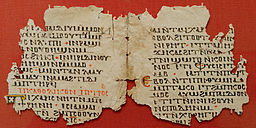The Bible contains a lot of questions, and it doesn’t always provide satisfactory answers. So I’ve been answering some of the Bible’s questions myself. This time, I’m looking at questions from when Saul was king of Israel.
Some Israelites ask: How can Saul save us? Answer: By threatening to destroy the property of any Israelites who don’t help him fight their enemies.
Samuel asks Saul: Why did you not obey the Lord? Why did you pounce on the plunder? Answer: He did obey the Lord, and he did not pounce on the plunder. He was still going to destroy all those animals, just like God told him to. He just hadn’t done it yet.
Samuel asks: Does the Lord delight in burnt offerings and sacrifices as much as in obeying the Lord? Answer: Who knows? The Bible has some seriously mixed messages on those issues.
After Jesse presents seven of his sons to Samuel, Samuel asks him: Are these all the sons you have? Jesse’s answer: No, there’s an eighth son. Alternative biblical answer: Yes, Jesse had seven sons.
Goliath asks the Israelites: Why do you come out and line up for battle? Answer: Because the Philistines did.
The Israelites ask each other: Do you see how this man Goliath keeps coming out? Answer: Probably. He seems kind of hard to ignore.
David’s brother angrily asks him: Why have you come down here? Answer: To see how you’re doing and to bring you food.
He also asks David: With whom did you leave those few sheep in the wilderness? Answer: Another shepherd.
Goliath asks David: Am I a dog, that you come at me with sticks? Answer: He’s coming at you with stones, not sticks.
Saul asks: What more can David get but the kingdom? Answer: Your daughter.
Saul asks his daughter: Why did you deceive me and let my enemy escape? Answer: Because your enemy is her husband.
Jonathan, skeptical of the idea that Saul is trying to kill David, asks: Why would he hide this from me? Answer: Telling you to kill David for him is not hiding it from you.
Jonathan asks David: If I knew my father wanted to harm you, wouldn’t I tell you? Answer: That seems pretty unnecessary when your father has already blatantly tried to murder David several times. Plus, you already did tell him.
Saul asks: Why hasn’t David come to the meal yesterday or today? Answer: Could it have something to do with the fact that you’ve tried to kill him repeatedly?
Jonathan asks a confused boy: Isn’t the arrow beyond you? Answer: No.
The Philistines ask: Isn’t this David, the king of the land? Answer: No, Saul is the king.
Achish king of the Philistines asks: Why must this madman come into my house? Answer: It was the madman’s idea to go to you. Ask him.
Saul asks: Is that your voice, David my son? Answer: No, it’s the voice of David Jesse’s son.
Saul asks: When a man finds his enemy, does he let him get away unharmed? Answer: Depends on how serious their enemyship is, the man’s moral beliefs, his self-control, etc.
Nabal asks: Who is this David? Answer: The son of Jesse.
He also asks: Who is this son of Jesse? Answer: David.
Then he asks: Why should I take my bread and water and the meat meant for my shearers, and give it to this David guy? Answer: Because he deserves a reward for not harming you. /s
Abner asks: Who are you who calls to the king? Answer: Nobody’s calling to the king. He’s calling to the commander.
Ghost-Samuel asks Saul: Why do you consult me, now that the Lord has departed from you and become your enemy? Answer: Because he can’t consult the Lord, because the Lord has departed from him and become his enemy.
The Philistines ask: How better could David regain Saul’s favor than by taking the heads of our own men? Answer: He doesn’t need to. He already did that a few chapters ago.
The Philistines ask: Isn’t this the David who the women of Israel sang about, saying he had slain tens of thousands? Answer: Yes, but they were wrong. He hadn’t done that yet.
Continue reading The Bible’s questions, answered—part 4: Answers to questions in the reign of Saul →
